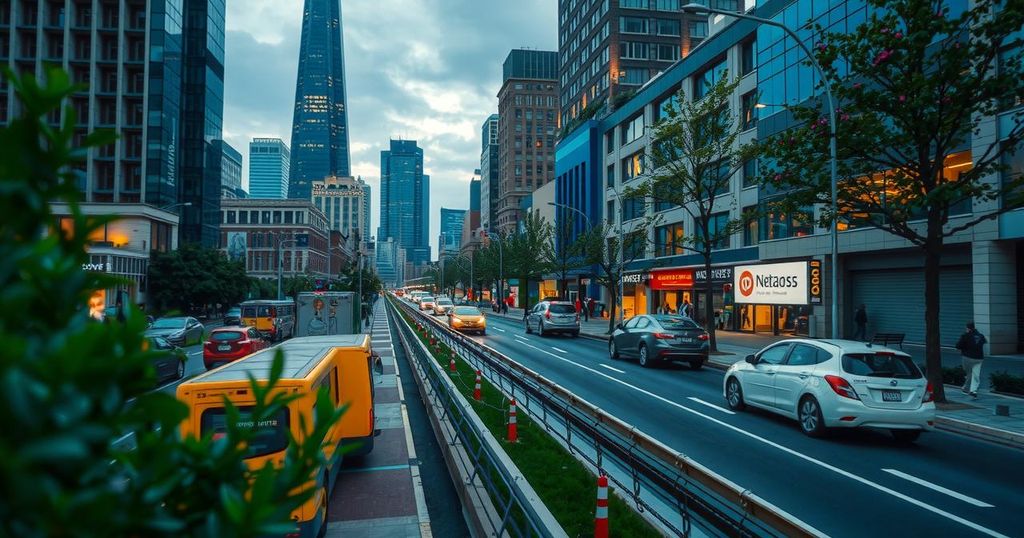The Economic and Environmental Imperative of Reducing Car Dependence: A $6.2 Trillion Opportunity

A study by the Union of Concerned Scientists reveals that reducing car dependence in the U.S. could save $6.2 trillion while contributing positively to climate change efforts. By decreasing vehicle miles traveled by 27% from 2035 to 2050, significant infrastructure costs could be avoided, and public health improved, creating a vision for more equitable transport options.
A recent study conducted by the Union of Concerned Scientists presents compelling evidence that reducing car dependence in the United States would not only address climate change by decarbonizing the transportation sector but could also yield significant economic benefits amounting to $6.2 trillion. This report, titled “Freedom to Move,” emphasizes that providing citizens with diverse, viable transportation options is crucial for achieving the critical net-zero emissions target. The study suggests that decreasing vehicle miles traveled (VMT) by 27 percent between 2035 and 2050, a target less stringent than existing goals in states like California and Washington, would eliminate the need to construct approximately $201 billion in new energy infrastructure required for electric vehicles. Moreover, the initiative could spare the country $128 billion in avoided public health costs related to emissions from both traditional and electric vehicles. The report also estimates that 250,000 car crash fatalities and 3.7 million injuries could be averted through reduced VMT, producing further economic savings. Notably, American households stand to benefit significantly; achieving these changes could result in $5.9 trillion savings from reduced expenditures on car payments, fuel, insurance, and other related costs. Kevin Shen, the principal author of the report, emphasized that enhancing transit options and lessening reliance on cars would yield equitable benefits for communities across the nation. While the transition would not necessitate a complete abandonment of cars, lifestyles could adapt, allowing for reduced vehicle purchases and increased use of alternatives such as e-bikes, especially if urban planning evolves towards centralization. Despite the potential for positive change, Shen acknowledges that overcoming the deeply ingrained car culture and the influence of powerful automotive and fossil fuel industries is a formidable challenge. The report highlights that approximately 30 percent of Americans do not drive due to various reasons including age, disability, and financial constraints. Meanwhile, 60 percent of individuals reside in areas where transportation and housing costs are prohibitively high, disproportionately affecting people of color. Ultimately, Shen affirms that rethinking the concept of “freedom” in relation to transportation is vital. The vision is for a future where freedom encompasses a range of travel choices rather than solely the ability to drive. By emphasizing the enormous potential benefits of reducing car dependence, the researchers aim to steer the conversation towards effective solutions to combat climate change, recognizing their role in shaping the narrative historically associated with transportation policy.
The issue of car dependence in America is deeply rooted in the nation’s infrastructure and transportation policies, which have traditionally favored automotive and fossil fuel industries. The focus on vehicular transportation has led to a range of societal repercussions, including health consequences from emissions, economic burdens from car ownership, and inequities in mobility access. This study provides a fresh perspective by advocating for a multi-modal approach to transportation that advocates public transit, biking, and pedestrian-friendly urban designs to address both environmental and socio-economic challenges.
In conclusion, the Union of Concerned Scientists’ report underscores the pivotal role that reducing car dependence can play in enhancing public health and economic vitality while significantly contributing to climate change mitigation. By fostering diverse transportation options and reimagining urban planning, the United States has the potential to achieve an equitable and sustainable future. However, this vision necessitates a concerted effort to counter the entrenched interests of autonomous automotive industries and foster systemic change in transportation policy.
Original Source: usa.streetsblog.org





